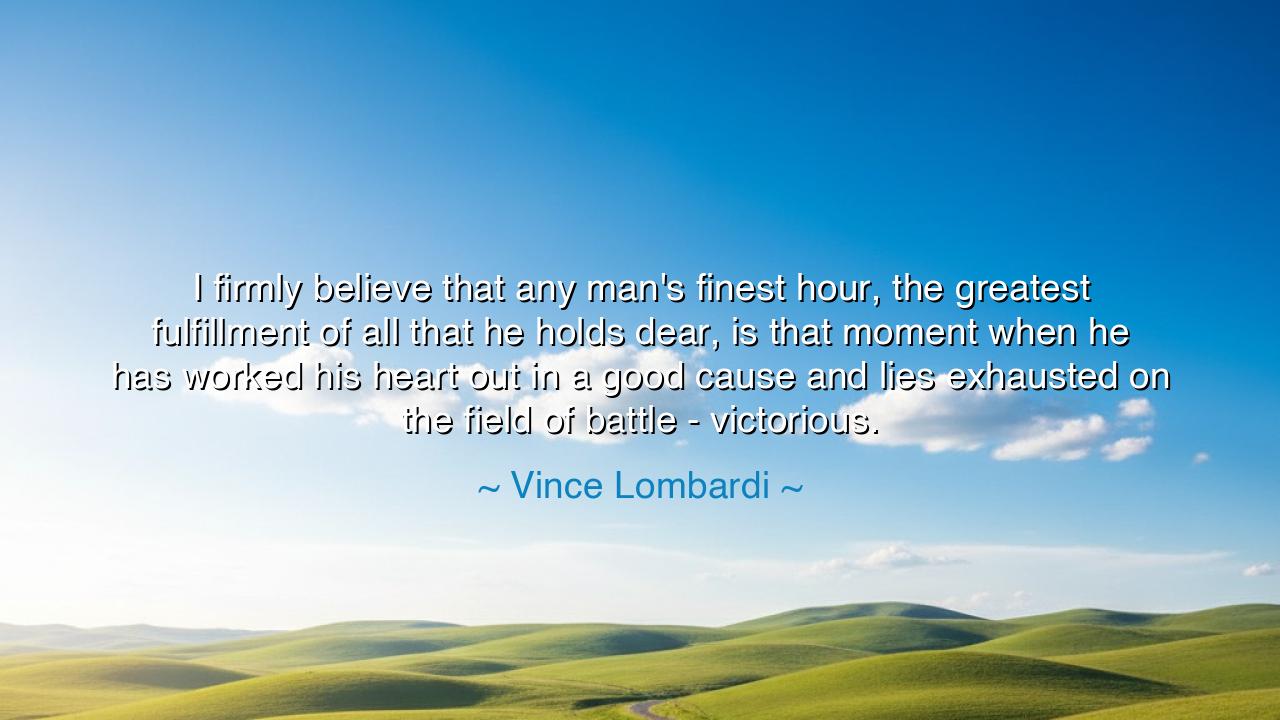
I firmly believe that any man's finest hour, the greatest
I firmly believe that any man's finest hour, the greatest fulfillment of all that he holds dear, is that moment when he has worked his heart out in a good cause and lies exhausted on the field of battle - victorious.






"I firmly believe that any man's finest hour, the greatest fulfillment of all that he holds dear, is that moment when he has worked his heart out in a good cause and lies exhausted on the field of battle—victorious." — Vince Lombardi
In these immortal words, Vince Lombardi, the legendary coach of the Green Bay Packers, speaks not merely of sport, but of the eternal struggle that defines the human spirit. His quote is not a celebration of victory alone, but of the honor of effort, the sacred exhaustion that follows a life lived with purpose. When he says, “worked his heart out in a good cause,” he captures the essence of greatness—the idea that fulfillment does not come from comfort, nor from fortune, but from the relentless pursuit of something worthy. The field of battle may be a football field, a workshop, a classroom, or the long road of life itself—but the principle is the same: only in the furnace of struggle is the soul refined.
The origin of this quote can be traced to Lombardi’s life as both a coach and a philosopher of perseverance. Born to a working-class family in Brooklyn, he understood hardship early. His Catholic upbringing instilled in him the virtues of discipline and sacrifice, and throughout his career, he taught that true victory comes from exhaustion in service of excellence. To him, greatness was not the domain of the gifted, but of the devoted—those who gave their all, holding nothing in reserve. Lombardi’s players often spoke of how his words drove them to transcend pain and doubt, to reach a state where labor itself became glory. In his philosophy, to lie exhausted yet victorious was to taste the highest form of joy a human being could know.
This quote echoes the wisdom of the ancients, who too revered struggle as the path to virtue. Heraclitus, the Greek philosopher, once declared, “Out of strife comes the fairest harmony.” And Marcus Aurelius, the Stoic emperor, taught that the obstacle becomes the way. Lombardi’s vision is born from this same truth: that life’s finest hour is not found in ease, but in endurance. The warrior who returns from battle battered but unbroken, the artist who spends sleepless nights perfecting his craft, the mother who labors tirelessly to raise her children—all share in this noble exhaustion. For it is not the struggle itself that fulfills us, but the cause to which the struggle is given.
Think of Sir Ernest Shackleton, the Antarctic explorer, who led his men through unimaginable hardship when their ship, Endurance, was crushed by ice. Shackleton’s crew faced starvation, freezing winds, and the long despair of endless winter—but they survived because he inspired them to keep going, to believe that their suffering had meaning. When at last they reached safety, they were not defeated, though their bodies were broken. In that moment, they knew the finest hour Lombardi spoke of: that sense of triumph born not from ease, but from the crucible of trial. They had worked their hearts out in a good cause—the cause of survival, brotherhood, and faith—and emerged victorious.
Lombardi’s teaching reminds us that victory is not defined by scoreboards or medals, but by the depth of commitment we give to what matters most. The great fulfillment he describes comes only when the heart is emptied in service of something larger than oneself. The modern world tempts us with shortcuts, with comfort and applause—but the wise know that the joy of achievement lies not in its reward, but in the road that leads there. The path to greatness is rough and steep, but those who walk it discover what the idle never will: that the weariness of honest effort is sweeter than the rest born of idleness.
And yet, there is humility in Lombardi’s vision. He does not promise victory to all, only the peace that comes from having given one’s all. Even the one who falls short, who lies defeated but unbroken, has achieved a kind of victory—the triumph of courage, the mastery of self. For in every true endeavor, the journey itself becomes the prize. The one who strives with honor, who pours out his strength for what is good, lives already among the great.
So, my child of the future, take this teaching as your shield in the battles of life: give your whole heart to what you do, and measure your worth not by your trophies, but by your effort. Seek causes that uplift, tasks that test your mettle, and duties that demand your best. Work until your body is weary and your soul is proud. When you stand upon the field—whatever your field may be—may you find that sacred exhaustion Lombardi spoke of. For in that moment, when your heart is empty but your spirit is full, you will know what it means to have lived well. You will have reached, at last, your finest hour, and in that hour, you will be victorious.






AAdministratorAdministrator
Welcome, honored guests. Please leave a comment, we will respond soon